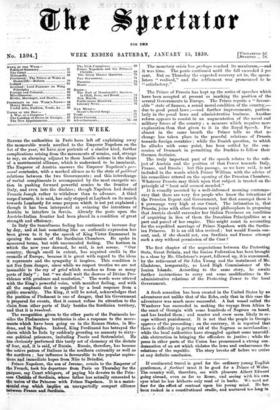The Prince of Prussia has kept up the series of
speeches which have been accepted at present as marking the position of the several Governments in Europe. The Prince reports a " favour- able " state of finance, a sound moral condition of the country,— due to good penal laws ;—and further improvements, particu- larly in the penal laws and administrative business. Another reform appears to consist in an augmentation of the naval and military forces of the country ; a measure which requires more explanation than that given to it in the Royal Speech. For almost in the same breath the Prince tells us that no change has taken place in the peaceful relations of Prussia towards foreign countries ; while the Danish question, to which he alludes with some point, has been settled by, the con- cession of Denmark in permitting the Duohies to follow their German destinies.
The truly important part of the speech relates to the sub- ject of Austria and the position of that Power towards Italy, France, and Russia ; but this passage, as we have said, is not included in the words which Prince William with the advice of his councillors uttered on the opening of the Prussian Chambers. Whatever Prussia may think upon that subject is treated on the principle-of "least said soonest mended."
, It is roundly asserted' by a well-informed morning contempo- rary that' there are very few people who know the intentions of the Prussian Regent and Government, but that amongst those is a personage very high at our Court. The intimation is, that Prussia; joins with other German royal philosophers in proposing that Austria should surrender her Italian Provinces on condition of acquiring in lieu of them the Danubian Principalities as a part and parcel of her empire. This might assist in accounting for the expedited marriage of Prince Napoleon with the Sardin- ian Princess. It is an old idea revived ; but would Russia con- sent, and, if she should not, can Sardinia and France attempt such a step without permission of the Czar ?


























